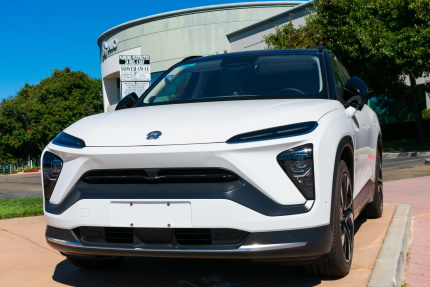NIO is up another $4 a share with electric vehicle sales soaring.
This morning, NIO said it delivered another 7,007 vehicles for December 2020, an increase of 32.4% month over month, and 121% year over year. For the full-year, NIO managed to deliver 43,728 vehicles, a year over year increase of 112.6%.
“2020 has been a challenging year for the whole world. Against this backdrop, NIO has achieved consecutive record-highs along the way and closed the year on a high note with remarkable December deliveries of over 7,000 vehicles,” said William Bin Li, founder, chairman, and chief executive officer of NIO.
“These results are attributable to the growing recognition of our premium brand, the competitive and compelling products, and services, the expanding sales network, and most importantly, the continuous support from our passionate and loyal user community,” he added.
Since bottoming out at $2.23 in March 2020, Nio has now skyrocketed to $53.80 – and it appears nothing can slow it down. Helping quite a bit, J.P. Morgan just upgraded the NIO stock to a buy from a hold, increasing their target to $40 a share.
The firm believes China’s EV penetration could quadruple by 2025, “meaning that about 20% of all new cars sold in China would be battery powered,” as noted by Barron’s.
Earnings are just as impressive. The company’s adjusted loss came in at 12 cents, as compared to expectations for 18 cents. Revenue of $666.6 million beat $663.29 million. Gross margins came in at 12.9% as compared to expectations for 11.25%. Better, with Q4 2020 guidance, the company expects to deliver between 16,500 and 17,000 vehicles.
Better still, the EV boom shows no signs of slowing.
For one, according to the Boston Consulting Group, by 2025, EVs could account for a third of all auto sales. Two, governments all over the world are pushing for a greener, EV future.
In the U.S., California Gov. Gavin Newsom just signed an executive order that will ban the sale of gas-powered passenger cars in the state starting in 2035. In China, according to a McKinsey report, the country’s EV market share is expected to grow 11 to 14% by 2022.
In Europe, “Automakers need to sell more electric vehicles after EU lawmakers in December 2018 ordered them to cut CO2 emissions by 40 percent between 2007 and 2021, and then by a further of 38 percent by 2030, or face fines.”
Ian Cooper’s Personal Position in NIO: None






